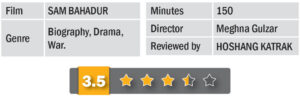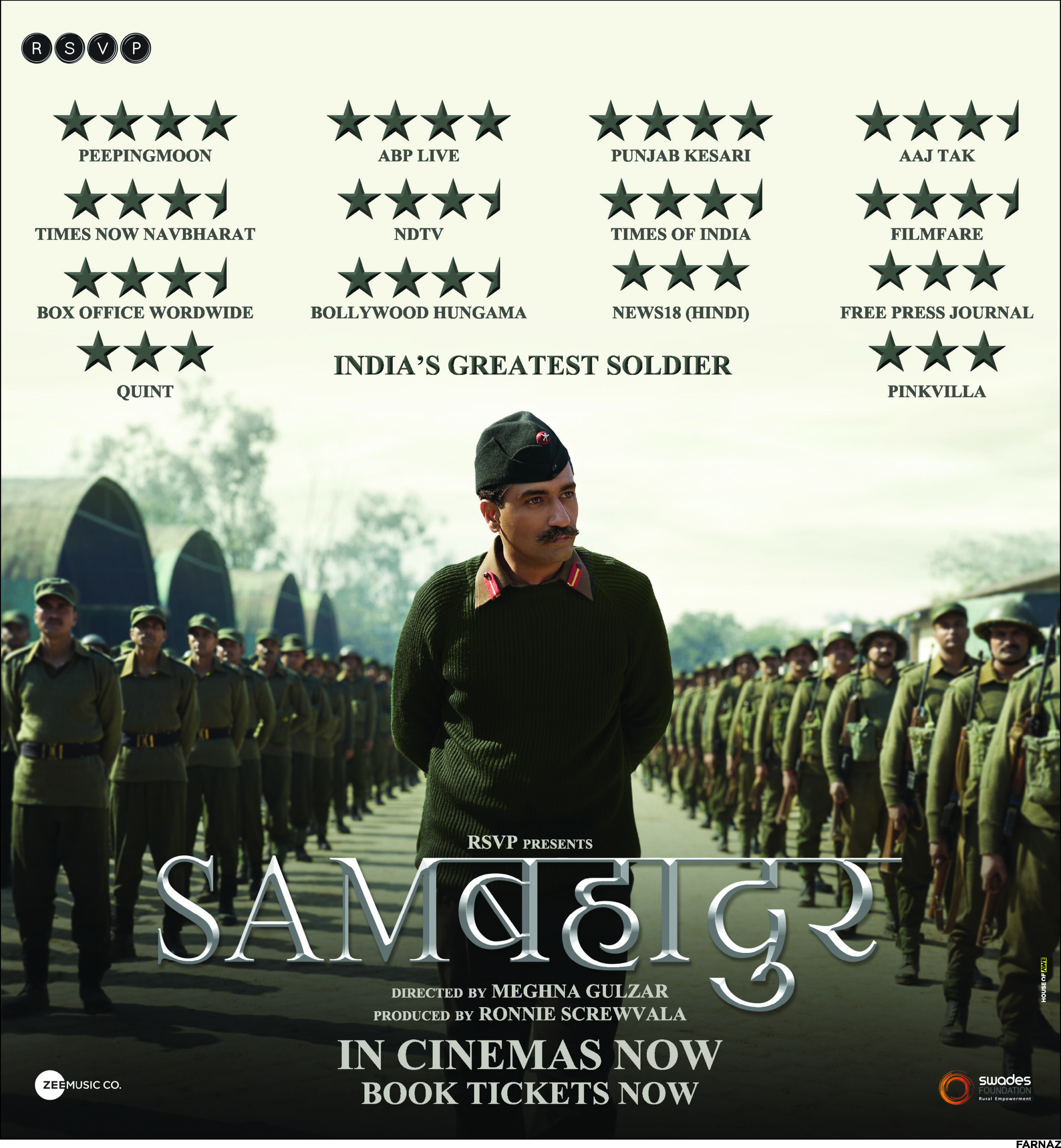
There’s often a fine line separating supreme self-confidence and arrogance, and by bringing to the big screen, a half century after Sam Hormusji Framji Jamshedji Manekshaw (3 April 2014 – 27 June 2008) retired and 15 years after his passing – the fearless, flamboyant and larger-than-life legendary war-hero, director Meghna Gulzar attempts to efface that blur.
Espousing a subject close to the hearts of a billion Indians, Gulzar constructs the life of the luminary across the five wars he participated in, stretching from WWII to the 1971 Indo-Pak war, the last one leading to the historic creation of Bangladesh, which turned India’s military might on its head.
The film opens with a Gurkha regiment jawan blurting out Bahadur (the name stuck famously) instead of Manekshaw. The later part of the film is depicted mainly via his interactions with his wife, subordinates and haughty bureaucrats and to some extent, through a series of strategy meetings among the three Chiefs of the Armed Forces.
The director and Vicky Kaushal stay true to their subject. Sanya Malhotra (wife Silloo) starts off on a promising note, and is later relegated to expressing disappointment at knowing her husband’s posting locations and displaying tinges of jealousy whenever Indira Gandhi’s (Fatima Sana Sheikh) name is mentioned or her phone rings… prime reason being SM addressing almost everyone, including Indira ‘Sweetie’!
Others cameos are Neeraj Kabi as Nehru, Mohammed Zeeshan Ayub as Yahya Khan, Govind Namdeo as Sardar Patel and Anjaan Srivastava as Y B Chavan. Meghna Gulzar brings along her team from her hugely successful 2018 ‘Raazi’ – cinematographer – Jay Patel, editor – Nitin Baid and music composers – Shankar-Ehsaan-Loy. Ketan Sodha’s background music evokes high level of jingoism required in such films.
For their research, the makers have drawn upon various sources, more particularly Brigadier Behram Panthaki’s book on Manekshaw (Panthaki was once ADC to Manekshaw). While the script doesn’t dwell upon any single war in detail, Vicky Kaushal is given good scenes displaying his versatility and ability to flesh out the character of the protagonist.
Although the makers depict scenes of SM being regarded as anti-national by Maj. Gen. Kaul and Defence Minister Krishna Menon due to his forthright and outspoken nature, the subsequent inquiry found him innocent and he was acquitted. (For the record, both were sacked the following year in 1962 after the Indo-China war.)
Gulzar, ending the film with SM being awarded the Field Marshal rank in 1973, steers clear of controversies such as President Abdul Kalam giving SM his arrears after 30 years, or the fact that in his funeral, neither the Defence Minister, nor any of the three Service Chiefs were present… no national day of mourning either. To make amends, Narendra Modi, then Chief Minister of Gujarat, promptly named a flyover in Ahmedabad in his name.
A strict disciplinarian and a brilliant war tactician – the Military Cross, Padma Bhushan, Padma Vibhushan awardee – Field Marshal Sam Manekshaw, who took nine bullets in his chest and abdomen in WWII, was able to inspire his men to courageous feats. In the film, real life army-men were employed – the bravado is ample evidence.
Inarguably, he was the most influential mortal to serve in the Indian army and a once in a lifetime hero! Right, ‘Sweetie’?
- Sau Saal Pehle… Celebrating Mohammed Rafi’s Birth Centenary - 21 December2024
- Parsee Gym Retains Supremacy In 7th Late Manek Golvala T10 Cricket Cup - 13 April2024
- Parsee Gym Holds 9th All-Parsee TT Tourney - 6 April2024
